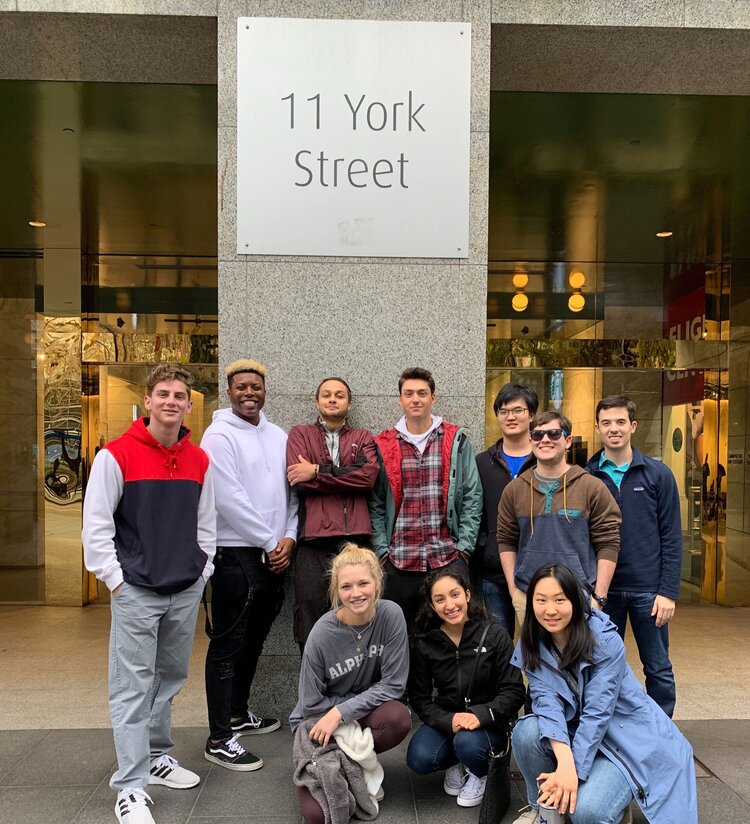BY: SAMINA ABDULLAH
Samina is a Computer Engineering Student at University of Michigan, Class of 2021. She interned at Zuper when she was a member of the Sydney cohort in for Summer 2019. As part of her role, she interviewed her boss to gain a better insight behind founding Zuper and what it entails to be an entrepreneur. Read their interview below!
|
Zuper is a Financial Service in Sydney that helps people better understand the power of their money, have more of it, and do more with it so they can enjoy a higher quality of life, make a positive impact on the world, and create the future they want. |
 |
Q: WHAT WAS YOUR BACKGROUND BEFORE ZUPER AND HOW DID IT LEAD YOU TO DECIDE TO START ZUPER?
I was working for Tyro Payment Solutions and I joined them when I graduated from university. I studied science – chemistry, then I went overseas to study music, and then I came back to Sydney to finish up my chemistry degree. Then I was like, “Mmm I’m not really sure that I really want to work in a lab”, so when I saw this job on offer at Tyro for a payment solution specialist, I applied. I really had no idea what the job entailed. I looked it up on the website and I didn’t understand any of it – it all seemed very technical. I went into the offices and I had been to a few other places and, honestly, I liked the offices so much I was like I hope I get that one. So, after the interview I wrote back to my interviewer and said “Thank you so much for the interview”, hoping I could put in that extra effort to stay at the top and it worked out. I was at Tyro for just over 6 years and then I met Jon and some other guys who are current shareholders and directors of Zuper and they convinced me to come join them. It could have been a bad decision because I didn’t know them very well, but I had been at Tyro for a long time. I could have stayed and it would have been fine because I was relatively young. However, I really liked the concept of what they were trying to do and I could see a lot of similarities between where Tyro had been 18 years earlier and the timing of the market being ready for something of that nature. I was like, “Ok, well I don’t have kids, I’m not married, I don’t have a house, I have no debt, I’ve got some money, so maybe I should become a founder!”.
Q: WHEN THE IDEA WAS PROPOSED TO YOU, DID THEY SAY THAT THEY WANTED YOU TO BE THE CEO?
Yes, which was quite confronting. It was interesting because, at the time, I was reporting to the CEO of Tyro so I had some insight into what being a CEO would be like – as much as you could – but never did I think that I could be one – till I got asked. Yes, you definitely have imposter syndrome for 6 to 12 months, and it sounds really weird to say I’m the CEO. Even now, it sounds weird, because I know people are thinking, “how could she be a CEO? She doesn’t have enough gray hair!”, but I have gotten used to it now. Ultimately, I think as a CEO, what you’re really trying to do is remove as much admin from other people as you can, so that the people around you can perform their best as a developer, product person, marketer, etc. So, it’s not as glamorous as it sounds – especially in a startup.
Q: WHAT IS YOUR FAVORITE PART OF WORKING AS THE CEO OF A STARTUP COMPANY?
I really enjoy working with you guys. It is so inspiring – just giving someone a problem and watching how they bring that solution to life is just so fascinating and I think you guys are doing an amazing job. But I really enjoy working with other talented people on the team – it’s the best thing. The other thing I think is cool is you’re in a position of power, right? So what can you do with that. Also, I think when you come into it as a woman, you probably have a bit more of a “gosh I should really use this” because I am in a position where people around you go, “are they really using their power to the extent that they could to inflict change?”, not just in the business, but I think you can do little things all the time. For Zuper, we are always thinking about how we can hire in a diverse way or how do we make sure that we think about different personas when we build the product.
Q: WHAT WAS THE HARDEST PART OF STARTING A COMPANY/WHAT IS SOMETHING YOUR HAVE LEARNED FROM STARTING ZUPER?
You have to have a lot of resilience. I use an analogy sometimes: you know when you’re on a bus and you’re standing up, holding on, and you don’t have a seat on the bus? The bus jerks and you can get pulled forward and back and forward. That’s kind of what it is like running a startup. You don’t have a comfy seat where you’re in a steady state. You’re standing on the bus and it’s going really really fast and then it brakes really quickly and then it takes off again. You have to somehow find your balance to stay on board, yet at the same time, while you’re doing that, you’re also strengthening your core muscles because you have to balance there and you don’t have a seat. I think with a startup that becomes the life. It’s a lot of extremes and there’s been many times when you come to the brink of do we have enough money to keep doing this, do we have enough willpower to keep doing this, and everyone keeps saying no but finally someone might say yes. You have to be really resilient and focus on the problem you are trying to solve which you sort of draw your energy from. That’s definitely been the hardest thing because everything else feeds into that, so you’ve got to have that willpower and tenacity. I suppose also to know when you should just stop as well – you can’t just keep doing it forever and ever. Everyone has to have this stop-loss point at which point I say I’ve given it my best shot. There’s a lot of mental tenacity and resilience you build and a lot of good skills you develop.
Q: WHAT DO YOU THINK THE KEY IS TO A SUCCESSFUL STARTUP?
Growth. Getting customers. Sharon who runs the hub has this statement, “Growth solves all your problems”, and it’s so true! I mean it doesn’t solve all of your problems, but generally speaking if you’re growing, everything else follows behind that. Growing is kind of like the chicken and the egg problem though, because often you need the money to grow so it’s like which one comes first. I think being laser focused on growth and understanding where that growth is going to come from: maybe getting contracts or agreements and other growth channels in place as soon as you possibly can and getting them at the lowest possible cost – if not free. Typically, I don’t think building the product is impossible. I think most people can build a product pretty well. Choosing what problem to solve with your product is slightly harder, but most people can get there. Where things fail is when it comes to growth and that’s definitely been our challenge and that’s every startups challenge. You have to get yourself into a position as a startup where you can solve that problem really quickly or buy yourself enough time with the capital you have available.
Q: WHAT WORDS OF WISDOM WOULD YOU GIVE TO SOMEONE WHO HAS AN IDEA FOR A STARTUP AND THINKS THEY MIGHT WANT TO START ONE?
I would say find the customer first and try to pre sell that idea to a potential customer. If you can find 10 people who say, “I definitely want that”, I would say that’s a good sign that you’re on the right path. Never build something in isolation. Lots of people do it, even as crazy as it sounds. Lots of people will convince themselves that something is a really great idea and go in, wasting money and time building it. I always tell people you need to sell your idea as soon as you can because it will teach you so much about what your product should be and whether you should bother. The other thing I think, which is really interesting if you’re a young person, is you might not want to start your entrepreneurship journey right now with the biggest idea you have. There are lots of ways you can create side hustles that generate you a passive income that you could then use to fund yourself when you do want to go out and start that big idea. I wouldn’t discount those traditional business models like online and e-commerce or even just a good investment. Then you can then go, “I’m in my mid to late twenties and I wanna do something different. Financially, I can afford to do it. Maybe this business pays me enough income for me to leave my job. Because there will come a point where to really achieve what you want to achieve with a start up, especially with one that is complex and not as cookie cutter, you’ll have to say goodbye job. You can’t really do both things. I think if I had my time again what I would do is I would start something on the side, whether that was an investment portfolio that I could cash out in 5 or 6 years that would pay me an income then for the next two years or starting some type of really simple online business – and I would learn lots of skills doing that – and I could get to a point where that would pay me a passive income. So then question about starting your new thing isn’t such a hard question because you can say, “I can leave this 60 80 salary behind because I’ve got financial security”. I know a lot of people who don’t make that leap and I see it even with my own friends. They don’t make that leap because they do earn really good salaries, and the older you get the harder it is to say no to that steady income because you build lots of things around it like mortgages. So putting yourself in a financially free situation, then you can take that risk.
Thanks for telling your story, Jess! Feel free to reach out to Samina on LinkedIn to ask her about her time at Zuper and see how Zuper has grown.

The Sydney Summer 2019 Cohort

